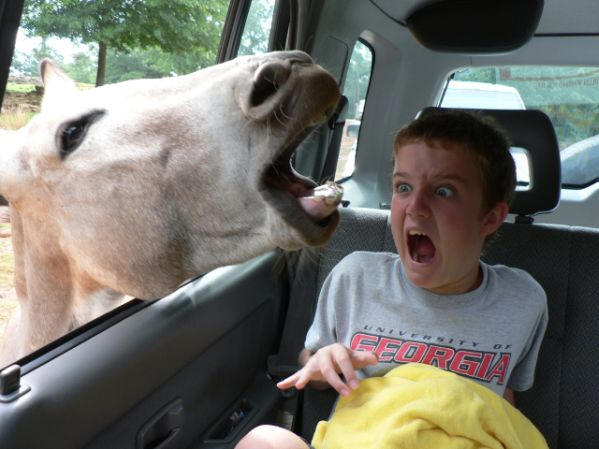365 Days in Horse Country – Biting

Horse bites are one of the most painful types of bites you
can get from a barnyard creature. When
jaws strong enough to masticate tough fibrous plant material come down on human
flesh, the results are excruciating.
Horses usually bite people for one of two reasons: They are trying to play, or they are being aggressive. Some horses that are hand-fed bite out of impatience, or in an attempt to coerce you into giving up the food.
Although a painful bite can hardly be seen by a person as an invitation to frolic, biting is a common play signal between horses. Horses that bite out of playfulness are not doing it to be mean, but the bite hurts just as badly. You can tell if a horse is biting out of playfulness by the expression on his face. If his ears are up and his bite was more of a nip than a gaping-mouth attack, chances are he is trying to play.
One the other hand, aggressive horses deliver bites with their ears pinned back and teeth bared; very clear signs.
If you have a horse that bites, you need to teach him that this is completely unacceptable behaviour. You also need to consider the root cause of the behaviour. A horse who delivers play bites may need more exercise or stimulation to burn off excess energy. A horse that bites out of aggression may be in pain or experiencing another kind of problem. This is especially likely if the horse has never been a biter before but suddenly begins to attack people.
First try to deal with whatever underlying issues may be triggering your horse’s biting. If your horse has suddenly started biting, have a veterinarian examine your horse to see if he’s in pain. If your horse is a play biter, give him more exercise and stop feeding treats to him by hand.
If the biting continues, start teaching your horse that this behaviour cannot continue while also protecting yourself from his powerful teeth.
Begin by learning to anticipate your horse’s behaviour. Pay close attention to him and notice the cues he gives you just before he opens his mouth to bite. Head him off at the pass by yelling “Quit” at the top of your lungs and jerking the lead rope if he makes a move to bite you. You can also raise your elbow and let him bang into it with his head as he moves toward you to bite. If he tries to bite you when are leading him, hold your fist up near his mouth so he smacks into your knuckles when he swings his head around to bite.
If all your attempts to stop the biting fail, contact a professional trainer for help. Biting is a serious problem that shouldn’t be ignored.
Michael







